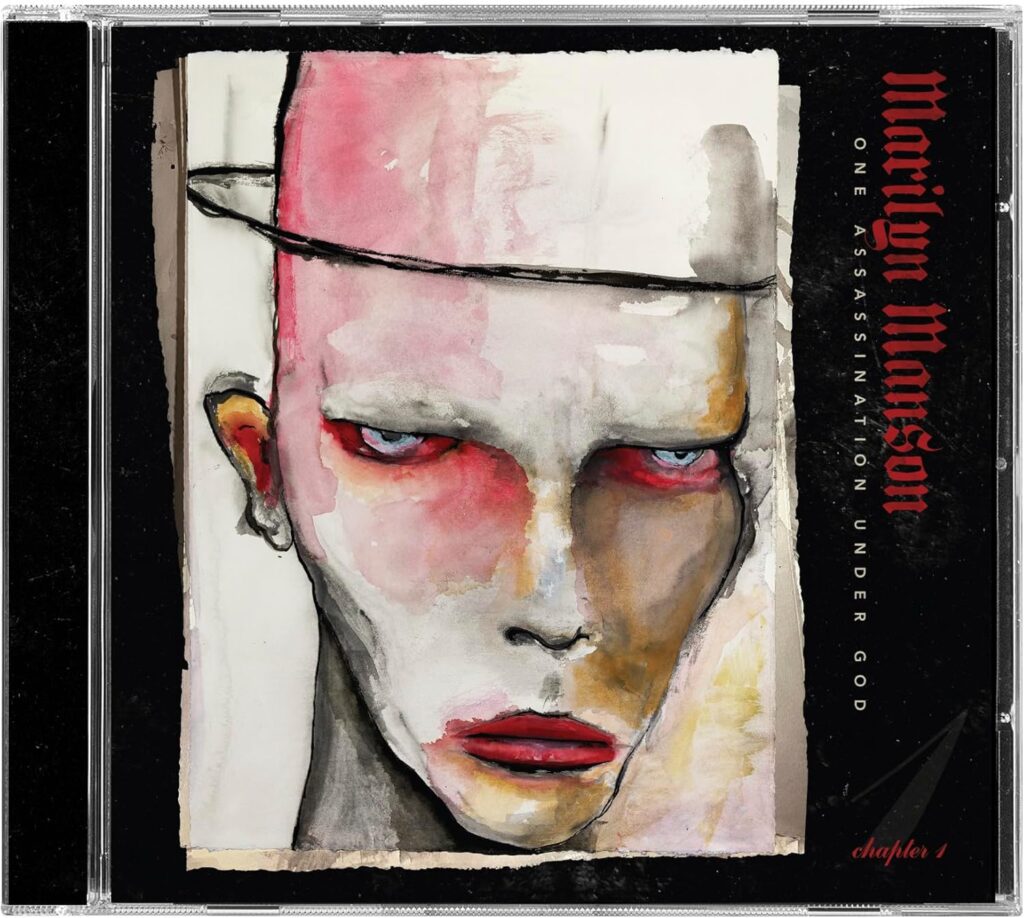
There was a time when it seemed Marilyn Manson had been silenced for good, a slew of legal actions resulting not only in his being dropped by his label and his management, but also a planned vinyl reissue of Mechanical Animals being recalled and destroyed at the last minute. What followed – a confusing flurry of lawsuits and countersuits – did little to clarify matters, with some actions apparently settled, some dropped, and others still pending. With the recent news that Manson has dropped his own suit against Evan Rachel Wood, it’s hard to know what will happen next but, given the stakes and money involved, not to mention that social media noise that has dogged the case, it’s likely that the full truth of the matter will never fully be uncovered.
What is certain is that it has been four years since the last Manson album, 2020’s We Are Chaos, and the ground has shifted sufficiently for Manson to recruit a new band, record a new album – One Assassination Under God – Chapter 1 – and ink a deal with Nuclear Blast. The album was tracked with returning drummer Gil Sharone (most recently seen performing with Jerry Cantrell), and multi-instrumentalist / composer Tyler Bates (both of whom worked on The Pale Emperor), while Piggy D. (Rob Zombie, Alice Cooper), and Reba Meyers (Code Orange), were brought into the fold for live dates.
Ultimately, with Manson no stranger to controversy, it should not be too surprising that he has returned. With the dust still swirling around various pending actions and the battle now so polarised on social media that any attempt at nuance is instantly lost amidst the noise, the decision to listen to his new album (or to avoid it like the plague) is a personal one which each listener will have to arrive at according to their own conscience.
And so to the album itself. It picks up, broadly, where the excellent The Pale Emperor left off, providing a more atmospheric and reflective journey than either Heaven Upside Down or We Are Chaos – both solid albums, but somewhat inchoate in comparison. It opens with the creeping discomfort of the title track, which appears to address Manson’s troubled past head on: “pull back the curtain, I won’t suffer for your amusement, there’s no more dreams for me to sell, I choose my nightmares wisely”. It’s a charged track, as you might expect, the mid-paced drums and synth embellishments parting to reveal the tightly wound guitars and melodic vocals – some of Manson’s best – at the song’s heart. Arguably one of the most affecting songs to which Manson has put his name, it’s an impressive start to the record, and it sets a high bar for what follows, which is often met, but not consistently. Next up, No Funeral Without Applause plays out like a spiritual sequel to Manson’s cover of Sweet Dreams, with its picked guitar and spooky synth passages providing a neat bridge between the industrial metal that has long been Manson’s stock in trade, and the melodic dark pop that inspired him. After all the digressions, from the glam departure of Mechanical Animals to the nu-metal-adjacent Holy Wood, it’s arguably the closest Manson has come to Antichrist-era material in years, and he wears it surprisingly well. Moreover, it paves the way to the darkly stabbing industrial of Nod If You Understand, another track that impressively recaptures the raw energy of Manson’s early work. “Pain is a language that was spoken to me, and now it’s my time to answer” warns Manson, as the guitars pile up around him. It’s a powerful track and one of the album’s finest moments.
With the opening tracks stripped back to the darker sound of Manson’s earlier work, there are still moments where his more theatrical sensibilities combine with Tyler Bates’ strengths as a composer, most notably on As Sick As The Secrets Within, the single that initially heralded Manson’s return. Taking the astringent guitars of The Pale Emperor as a starting point, it takes a surprising left step into Mechanical Animals territory via Coma White, the crooked melody and heavily accented synth parts painting a dark picture, even as lyrical references to worms nod to Warner’s mutation into Manson via Antichrist Superstar. It’s followed by Sacreligious, arguably the most Manson-by-numbers track here, with its Beautiful People rhythm and death-groove swing. Honestly, it feels like the track was written as a single, and it lacks the depth found elsewhere. That said, no one quite does sleazy industro-pop like Manson, and it’s easy to imagine his fans lapping it up.
Having played to the gallery, Manson somewhat perversely lifts the rhythm from Nine Inch Nails’ Closer for the pulsing death-disco stomp of Death Is Not A Costume. With elements of the Cure wrapped up in the Reeves Gabrels style guitars, it’s got an addictive melody at its heart, with Manson once again delivering an impressively restrained vocal performance. A grinding bass riff leads the way on Meet Me In Purgatory, a gritty post-punk inflected piece which finds Manson meeting 3Teeth on the same ground that found them covering Foster The People. Lyrically, it’s less impressive, opting for repetition over exposition, which is a shame, because the central conceit – that it’s far easier to judge over social media than hold up a mirror to your own concerns – is one worth exploring. The stabbing industrial with which the album opens returns on Raise the Red Flag, a satisfyingly crunchy track with lyrics that nod all the way back to Lunchbox. It leaves Sacrifice Of The Mass to close the album, an acoustic piece caught between the world weary Man That You Fear and Day 3, which finds Manson singing of his death, seemingly reflecting on the forces he unleashed when he first took on the Manson persona.
A concise album that predominantly focuses on Marilyn Manson’s formative years, One Assassination Under God – Chapter 1 most obviously takes its influences from Antichrist Superstar, Mechanical Animals and The Pale Emperor, and it benefits from one of Manson’s most carefully poised performances in years. It’s not perfect – Manson’s lyrics, once one of his strengths, offer a little too much repetition in favour of observation, while the pacing of the album as a whole could do with a Deep Six or User Friendly to shake things up a bit. That said, with strong melodies, solid production, and a number of memorable moments (not least the opening track, Meet Me In Purgatory and Nod If You Understand), certainly has much to commend it for those willing to give it a chance. 8/10



